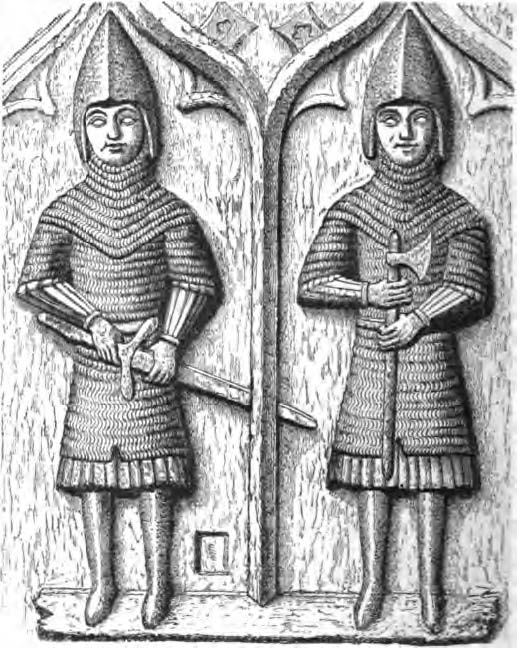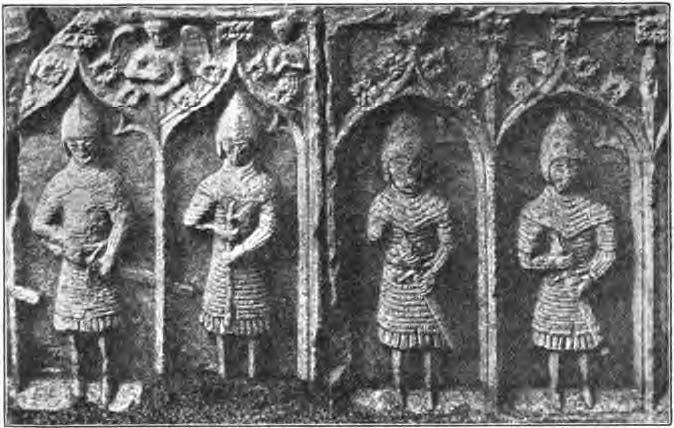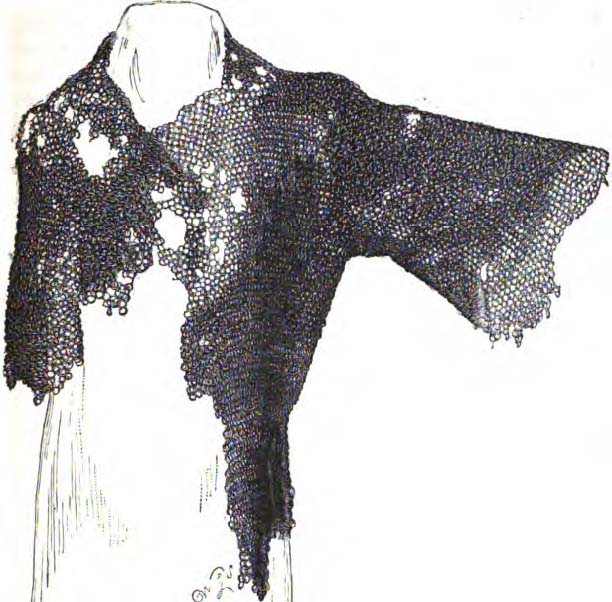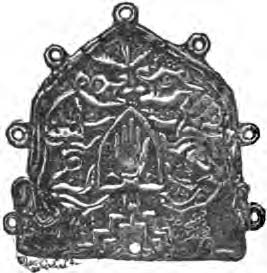Posts: 301 Location: Brisbane, Australia
Fri 24 Feb, 2006 2:55 am
Irish Dagger in ring-pommel ?....
Hi...this is such a great post. I am fascinated by Irish and Scottish arms and armour. I guess because they are so different. I have read posts and seen examples of daggers reproduced by some manufactures with the "matching" ring-pommel.....(matching the swords) as kind of a set. I guess that could be true apart from Skeins, but I cant find any reference for them . Does anyone know of historical reference for these or are they just made up as a manufactures' sales novelty?
Also, does anyone know the approximate
VARIATION of Skein blade-lengths...do they vary as much as the
Seax ?
Thanks for the data and input ! Its great.
Merv
 Attachment: 7.32 KB
Attachment: 7.32 KB
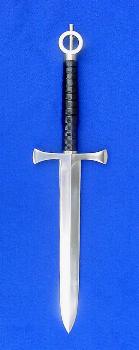
Posts: 5,981 Location: Birmingham, Alabama
Fri 24 Feb, 2006 6:49 am
I'm not aware of any historic ring-pommel daggers, but such a weapon is certainly within the realm of possibility. The skean seems to be much more common, and I suspect that the blade length of that weapon was pretty consistent (and very long). That's just a hunch, though.
Posts: 2
Fri 24 Feb, 2006 9:11 am
Help on irish stuff - at livinghistory.ie
Guys, an addendum, you can get a lot of extra Irish specific information at
http://livinghistory.ie
On the "skean" thing, you might get more information if you spell it "scian", as that's the modern Irish (Gaelic) spelling (I think skean is scots-gaelic).
Check out
http://livinghistory.ie/modules.php?name=Foru...ight=scian for instance - it's handy to have a board handy that has Irish archeologists available for questions!
John
Posts: 5,981 Location: Birmingham, Alabama
Fri 24 Feb, 2006 11:46 am
Thanks for the links, John! Love that scian! It's the best photo I've seen of a modern reproduction (and I've seen no photos of preserved originals). I take it that you are involved with Irish living history. We'd welcome any insight you can bring to our discussion. I'm especially interested to hear different experiences with/ interpretations of Irish darts.
Posts: 301 Location: Brisbane, Australia
Fri 24 Feb, 2006 3:33 pm
Re Skein
Yes, thanks John.........Ironically I joined the livinghistory ie forum last night ! Thats a very cool Skien alright. I have the steel right here and I want to make one as soon as I finish some furniture. I had my own business for over 25 years and faced a ever declining market and because of new technology, just when things couldnt get any worse, I got $80,000 worth of my gear stolen. So now I make medieval gear in wood, leather and metal. Ah well, at least I'm doing somthing I love.
Why are skiens so long ? For roastin' preadies ! (potatoes).... :lol:
Posts: 9,582 Location: Dayton, OH
Fri 24 Feb, 2006 8:18 pm
| Sean Flynt wrote: |
| Thanks for the links, John! Love that scian! It's the best photo I've seen of a modern reproduction (and I've seen no photos of preserved originals). I take it that you are involved with Irish living history. We'd welcome any insight you can bring to our discussion. I'm especially interested to hear different experiences with/ interpretations of Irish darts. |
Don't forget that we have a similar item featured in our collection galleries: http://www.myArmoury.com/nateb_dagg_ia_skean.html
:)
Posts: 5,981 Location: Birmingham, Alabama
Wed 12 Apr, 2006 6:13 am
I have completed three darts and can offer some preliminary observations:
First, a word about construction: The heads are the Modified Type 16 heads shown above. The shafts are tapered poplar. Heads are glued in place. Flush surface between shaft and head.
These look great! My first attempts at throwing were pretty dismal, however. I thought maybe poplar or the Type 16 heads (or both) are a bit too light. I also assume that the performance may be affected by my not having thrown spears from the time I was old enough to hold one :D Suffice it to say that I will not be taking the prize at the 2006 All Ireland Dart Casting. My casts were all over the place, head vertical, shaft sideways, etc. Holding the shaft closer to the back (giving more weight to the head) and casting in a high arc helped, but my casts had very little range, no accuracy, and were shockingly susceptible to wind.
Clearly, something was missing. I felt certain that my darts--straight and solidly constructed--were cable of better performance even in my hands. Maybe they needed flights for stability and spin. First, though, I wanted to see how finger loops would affect performance, if at all. Feeling that stability and power might be improved by a casting force from the rear of the dart, I tied a loop a short distance from the end of the dart. With my index finger in the loop and the loop wrapped one half-turn around the shaft to impart some spin on casting, I gripped the shaft lightly between thumb and remaining fingers. Wow, what a difference! The dart had greater range, was much more stable,described a neat arc and planted itself at a 45 degree angle in the yard. Take the the finger loop seriously, folks. It makes all the difference.
One of my tests resulted in the breakage of a shaft, and this led me to a theory about the wire(?) binding Bob mentioned in earlier threads. A careless cast sent one of my darts straight into a cinderblock wall. The head had not a scratch, and the thinnest part of the shaft (the part shaped to the inside of the socket) was fine. But the shaft split in half, starting just below the head and continuing down the shaft at an angle for a few inches to the outside of the shaft. This was easily repaired but the first thing I thought was that some sort of binding would have prevented that split or at least held the damaged dart together. So, perhaps the binding Bob mentioned served two purposes--to add helpful weight to the head of the dart and prevent this kind of splitting when the dart struck a hard target.
Next up: Three darts of late 15th c. type, with large, swallowtail broadheads as shown above. These will be fletched as well, either with feathers (I ordered a ridiculous amount of white turkey feathers) or leather. I expect the heavier heads and flights to make for improved performance.
Posts: 5,981 Location: Birmingham, Alabama
Fri 01 Sep, 2006 11:17 am
I accidently discovered this depiction of 15th c. darts while searching for arms & armour clues in historic artwork. This is the clearest and most informative image of darts I've yet seen. The artist even provides a handy human reference scale for us. If the soldier depicted is slightly shorter than we moderns, the darts shown are in the 50" range. The heads seem to be of the typical form seen elsewhere, including Ireland (wish I could find some at an affordable price).
Most interesting to me are what appear to be small weights at the base of each socket, confirming our previous speculation about wire bindings, etc. This is exactly the sort of thing I needed in my dart experiments, and I plan to incorporate them in my next dart project. The big question now is, "what are the weights made of?". Any guesses? Wood? Stone? Lead?
The Roman plumbata uses lead. Anybody got a few .80 lead blunderbuss balls lying around unused? Strange color for lead, though. Maybe some ordinary hardwood balls would be sufficient.
Notice what appears to be a boat-tail shaped shaft (thinner at the end opposite the head).
The painting is
Resurrection by Dieric Bouts The Elder (1415-1475)
 Attachment: 102.27 KB
Attachment: 102.27 KB
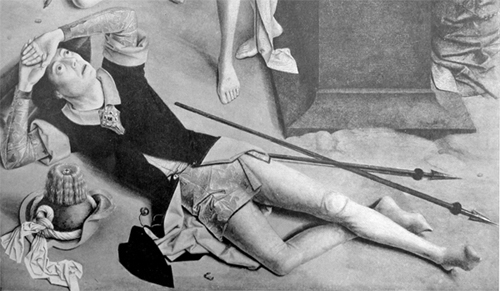
 Attachment: 97.59 KB
Attachment: 97.59 KB
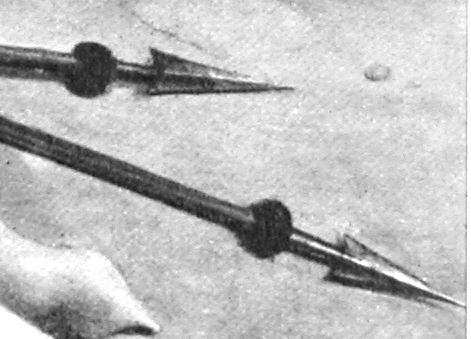
Posts: 5,981 Location: Birmingham, Alabama
Fri 01 Sep, 2006 11:43 am
The full-color version of another Bouts resurrection complicates things. Red? But not a tassle. And is that a finger loop?
I'm now thinking that whatever this thing is, it's not purely decorative, but probably not lead. Am I back to painted hardwood?
 Attachment: 27.38 KB
Attachment: 27.38 KB

Posts: 630 Location: Tucson
Thu 21 Aug, 2008 3:28 pm
to help pay for myself I am adding to this thread to keep it alive with a few things I don't think have been posted to myArmoury before ....... two pages from The Journal of the Royal Historical & Archaeological Association of Ireland circa 1882. One discusses the use of a scian (spelled skean in the doc and referred to as a dadagh) and a
shield belonging to the O'Donovan family both circa 1559. the dadagh looks like many of the hunting knives and messers of the 17th and 18th c.
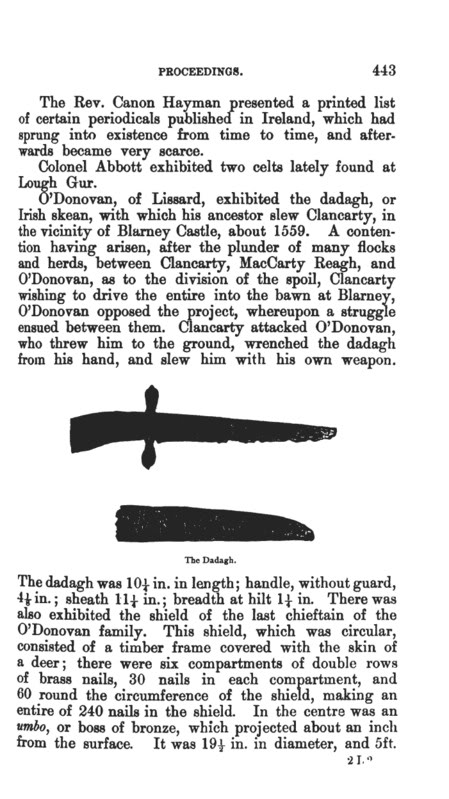

Last edited by Thom R. on Fri 22 Aug, 2008 9:29 am; edited 1 time in total
Posts: 5,981 Location: Birmingham, Alabama
Fri 22 Aug, 2008 5:13 am
Thanks, Thom! That target is especially interesting because we don't see many Irish examples and the design on this one is especially attractive. It's good to see that not everything Irish is festooned with elaborate knotwork.
The "without guard" reference simply means that the guard was not included in the grip measurement.
Posts: 630 Location: Tucson
Wed 27 Aug, 2008 12:53 pm
Last edited by Thom R. on Thu 28 Aug, 2008 10:01 am; edited 1 time in total
Posts: 630 Location: Tucson
Wed 27 Aug, 2008 3:03 pm
I also came upon this.... the effigy of one of the Burkes from the churchyard in Ballynakill. Its a lifesized limestone slab and is probably contemporaneous with the work at Roscommon
 Attachment: 66.95 KB
Attachment: 66.95 KB
[ Download ]
Posts: 398
Wed 27 Aug, 2008 4:30 pm
here is a helmet that might have possibly been used by a gallowglass
not sure of the provenance...
 Attachment: 22.97 KB
Attachment: 22.97 KB
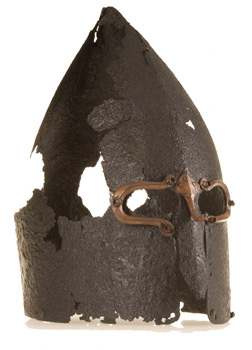
Posts: 630 Location: Tucson
Thu 28 Aug, 2008 10:41 am
here is why I am looking through some of these old journals - this one is a bit of a mystery and if anyone knows more about this effigy I would love to know where it resides. In addition to the rather famous carving of a knight in the window pillar which you can still see today when you visit Jerpoint Abbey (below), apparently there was another at one time that had broken into fragments and had to be put back together in order to get a rubbing which was then rendered into a sketch (attached). It contains two knights in full
chain mail, one with a
great helm, one with
chainmail coif, each holding single hand swords that appear to have type M pommels :!: and slightly curved type 7,8, or even a type 9 cross. having visited this historical site, I do not recall this particular carving of the two knights on display and wonder where the fragments now reside. tr
 Attachment: 73.23 KB
Attachment: 73.23 KB
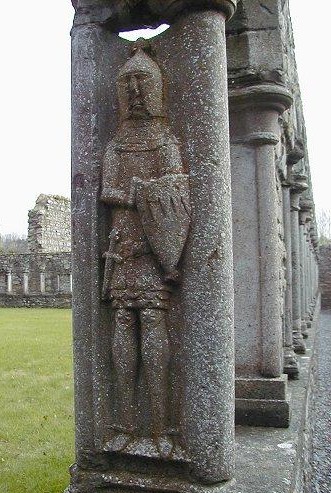
 Attachment: 62.31 KB
Attachment: 62.31 KB
[ Download ]
Posts: 27 Location: Ontario,Canada
Sat 30 Aug, 2008 6:25 am
Peter, I think you will find that "coloured after the Spanish fashion" means the method by which the targe was dyed.
Posts: 630 Location: Tucson
Tue 02 Sep, 2008 4:57 pm
some 16th c armour
Last edited by Thom R. on Tue 02 Sep, 2008 5:24 pm; edited 1 time in total
You
cannot post new topics in this forum
You
cannot reply to topics in this forum
You
cannot edit your posts in this forum
You
cannot delete your posts in this forum
You
cannot vote in polls in this forum
You
cannot attach files in this forum
You
can download files in this forum







